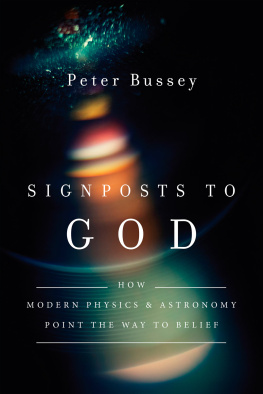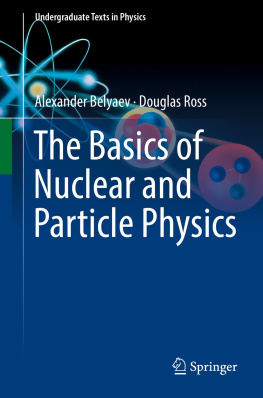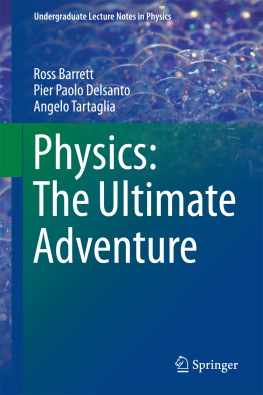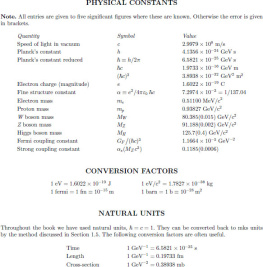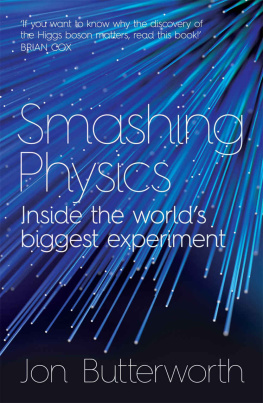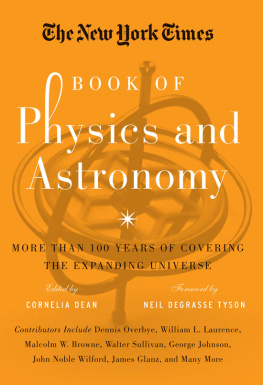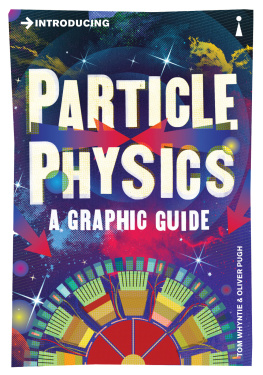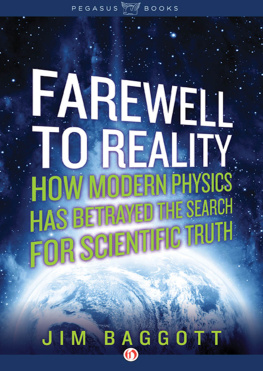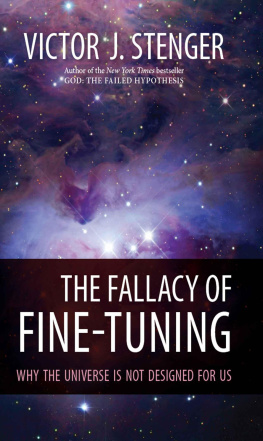SIGNPOSTS TO
GOD
HOW
MODERN PHYSICS & ASTRONOMY
POINT THE WAY TO BELIEF
Peter Bussey
InterVarsity Press
P.O. Box 1400, Downers Grove, IL 60515-1426
ivpress.com
2016 by Peter J. Bussey
All rights reserved. No part of this book may be reproduced in any form without written permission from InterVarsity Press.
InterVarsity Press is the book-publishing division of InterVarsity Christian Fellowship/USA, a movement of students and faculty active on campus at hundreds of universities, colleges and schools of nursing in the United States of America, and a member movement of the International Fellowship of Evangelical Students. For information about local and regional activities, visit intervarsity.org.
All Scripture quotations, unless otherwise indicated, are taken from THE HOLY BIBLE, NEW INTERNATIONAL VERSION, NIV Copyright 1973, 1978, 1984, 2011 by Biblica, Inc. Used by permission. All rights reserved worldwide.
Cover design: Faceout Studio
Interior design: Jeanna Wiggins
ISBN 978-0-8308-7307-4 (digital)
ISBN 978-0-8308-5149-2 (print)
This digital document has been produced by Nord Compo.
ONE
INTRODUCTION
T he assumption is widespread in modern society that religious belief and science are in conflict. This is despite the fact that practicing scientists have views on religion that are as divided as those of any other section of the population, ranging from committed belief to equally firm unbelief. Although the situation is far from clear-cut, the perception of a conflict is certainly very prevalent, and there seem to be two particular reasons for it. Both are based on what can be called social myth.
The first of these may be thought of as a myth of progress. There are a number of variations on this, and the myth holds a genuine attraction because a belief in social progress can perhaps help progress to take place in practice. One perspective on progress is a confidence that human beings are steadily growing in knowledge and understanding, which is something that is spectacularly illustrated by the progress seen in science over recent centuries. It seems that, day after day, more scientific discoveries are being made. Religions by contrast appear old fashioned and static. The social progress myth, therefore, can very easily develop into an impression that the contrast between science and religion in this respect is so great as to amount to a conflict.
Religion may not be the only casualty of this kind of outlook. Another noteworthy area of human activity that seems to have been outpaced by science is philosophy. Philosophy is commonly acknowledged as valuable for scholarship and intellectual training, but the subject does not appear to be making many real advances these days, or so it might seem. There are prominent scientists who are outspokenly dismissive of philosophy.
At the level of the individual, an important version of the progress myth concerns growing up. A child may be brought up in traditional religious beliefsChristian, let us say. Teachings about how science works do not at first appear much at school; there may be an introduction to nature studies, fossils and some astronomy. As the years progress, the young teenager is introduced to science in a stronger way, and it creates a very powerful impression. Growing up, in this version of the myth, implies taking hold of science and relinquishing religion as something childlike. This is seen as a form of personal progress. If the parents are believers, the young person just sees them as old fashioned. Genuine personal maturity is different, however, and means acknowledging myths and evaluating them with judgment and perception. It also means acknowledging different kinds of knowledge.
A social myth of a completely different kind is what may be called the myth of physicalism. Formerly more often called materialism, physicalism is the claim that the science of physics gives in principle a complete account of all that exists. The position has been well summarized by the University of London philosopher David Papineau, who states confidently in a book on the social sciences, We are all physicalists now. It was not always so. A hundred years ago most educated thinkers had no doubt that non-physical processes occurred within living bodies and intelligent minds.... The point would have been agreed by most practising scientists of the time. Yet nowadays anybody who says that minds and bodies involve non-physical processes is regarded as a crank.
This is very strong language, but I believe that it expresses nothing more than an intellectual myth. The crucial question to be asked is, does anyone really believe in physicalism? The answer: surely almost nobody. The myth of physicalism may be given considerable publicityit carries a message that many think they want to hear and many of its advocates speak of it as a proven fact. But in their hearts, do they actually accept it? Even though people may openly advocate physicalism with one part of their mind, in all other respects their attitudes and behaviors say something quite different. As human beings, we simply do not have any inward conviction that we are mere physical machineswe know that there is more to who we are than this. As well as the physical, which here includes the chemical and the biological, there are also mental and spiritual sides to our existence, and they need to be regarded in a very different way. It is hard to see a basic justification for assuming that one single human intellectual discipline, namely physics, should be capable of accounting for everything that exists. If the science of physics were truly at this exalted level, there would indeed be a conflict, not only with most types of religious belief, but with other areas of human culture as well.
It is easy to observe that those who claim to be physicalists are in all other respects pretty much the same as everyone else. They display emotions, opinions, values and other normal human attributes, just as the rest of us do. All this corresponds not in the least to a viewpoint on life that they are no more than functioning mechanismslacking therefore in free will and all the other human qualities that physics can say nothing about. The physicalists may talk physicalism, but they neither act it nor live it. It is hard to avoid the suspicion of an intellectual pose. Still, could it perhaps just be that the two sides of their brains have gotten out of balance? The rational, logical half has come to act independently of the warmer, emotional, artistic, personal human half? That is hypothetically possible, but to be frank, I believe that we are seeing a serious case of doublethink. All the indications are that physicalism is a very shallow and fashionably held concept.
A possible response to these accusations might be to say that the more human-oriented language and attitudes are being employed as a convenience, but they are really no more than that. This appears to be the view of many who call themselves physicalists, but it surely will not do. It is one thing to say that Joe Smith thinks in the manner of a traditional human being but is mistaken, for he is in fact really a machine. It is quite another matter to claim to know this truth about yourself but to continue to behave as if you did not. Hence the unavoidable charge of doublethink. Once the supposedly enlightened insight has been gained that all ones moral convictions, personal values and so on are nothing but a product of neuron activity in the brain, then the only honest action is to demote all of these things to mere private inclinations and foibles and to be open about it all. But, of course, this is not what we actually find. The self-proclaimed physicalists are usually just as sincere as everyone else about the authenticity of human moral values, for example. Should we suspect this to be merely a play-act? A feigned position adopted in order to impress others? NoI think they do really believe in these human qualities, and it is the physicalism in which at heart they do not believe.

